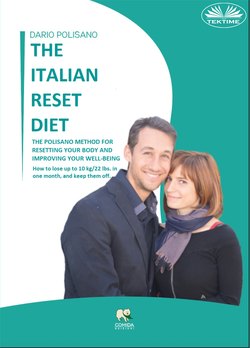Читать книгу The Italian Reset Diet - Dario Polisano - Страница 5
CHAPTER 1
THE “HEALTHY” MEDITERRANEAN DIET
Premise
ОглавлениеThe end of the Second World War was a very important and significant event in the history of mankind. Other than redistributing the population map of the West, in the early post-war period (around 1950), a true food revolution began to put strain on our bodies. The human body functions like a well-oiled machine, but when atypical dietetic conditions occur, it needs time to make the best of these new conditions. Yes, our genes do not mutate easily; it takes thousands of years for significant change in the human genome. When we input something in our immune system that is not recognized, the body does not work properly. It is up to us, maybe with the help of a nutritional biologist, to bring everything back to normal.
The consequences of this food revolution presented themselves almost immediately. In fact, from 1950 to today, numerous new pathologies have appeared, and they are putting the best researchers in the pharmaceutical field to the test. We used to fight bacterial infections; today these are gone, making way for metabolic, tumoral and autoimmune diseases, whose causes they say are unknown. To name just a few: type 2 diabetes is affecting 246 million people, and in Italy alone there are 6 million patients with thyroid dysfunctions. In addition, there are 3 million people with multiple sclerosis, and 1,000 tumor cases are discovered in Italy every day. We could go on and on with these dismal statistics, but better to stop and make sense of it all. Despite these frightening data, we continue to believe that medicine has taken several steps forward and that life-spans have increased; honestly, I do not believe that it is anyone’s dream to live to 85 if it means being a depressive slave to ten medications, with fewer organs than before and with an inability to walk autonomously. Do you? I really do not think so.
Even today, we continue to ignore the close connection between the explosion of illnesses and the aforementioned food revolution—on the contrary, we are constantly invited to follow the “healthy Mediterranean Diet,” recognized ever since 2010 as being on the Representative List of the Intangible Cultural Heritage of Humanity by UNESCO. The consequences of these facts are devastating: I find myself in the office writing up food regimens for children with fatty livers, and rebalancing the bodies of adolescents dealing with the onset of lupus erythematosus, psoriasis, and various autoimmune diseases. What saddens me the most is that every day, when I ask new patients about their medical history upon their preliminary analysis, many of them sit down and say that there is nothing wrong with them. Considering their (maybe even a tad advanced) age, I find myself insisting they reflect on their condition:
Me: “Ma’am/Sir, are you sure you do not have any ailments?”
Patient: “No, doctor, I’m sure.”
Not convinced, I ask the customary question:
Me: “Are you on any medication?”
Patient: “I only take a pill for my diabetes and one for my blood pressure.”
It is moments like these that clue me into how much the average Westerner is used to relying on drugs, and to being in constant contact with diseases—so much so that they are considered a part of us. More depressing still, after reprimanding them for neglecting their own health, I often hear: “Doctor, if you call these illnesses…” or “I take the pill and I’m fine.” It is then that I understand that it is not really their fault, but rather society’s. Society does not facilitate the spreading of health awareness. Eastern populations, though not as technologically advanced, have an inherent respect for their own bodies. In Japan and India, for example, they live using natural treatment methods for their bodies and minds, which are methods available to all, and that are inculcated in them since childhood. Health education and respect for our own bodies are the really important things in this life. We should consider ourselves lucky that our conscience or spirit, (depending on one’s beliefs), came to be in a healthy body. And yet what do we do instead? We destroy our cells with the crap that is offered us every day. Adults, with their food miseducation—but even worse, with their arrogant assumption that they are perfectly able to safeguard their children’s health—convince their kids that the products they are consuming are the best for keeping in shape. Chocolate and candy are the rewards for children who receive good grades or who do well in class. Holidays, religious or not, are a pretext for preparing lavish meals where the majority of guests, as soon as the guest of honor appears, fling themselves toward laden trays of food that is anything but natural. Sometimes we are so fixated on the food that we forget even to congratulate the honoree. And what kind of a party would it be if it did not end by gorging on sweets?
